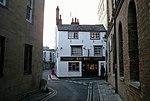The Bear (historically associated with The Bear Inn) is a pub in Oxford, England, that was founded in 1774 as The Jolly Trooper. It stands on the corner of Alfred Street and Blue Boar Street, opposite Bear Lane in the centre of Oxford, just north of Christ Church, on the site of St Edward's churchyard. It was converted from the early 17th century residence of the stableman (ostler) for the coaching inn, The Bear Inn, which was on the High Street, Oxford. When The Bear Inn was converted into private housing in 1801, The Jolly Trooper changed its name to The Bear (or The Bear Inn). There is a claim that by adopting its name, the current (1774) Bear Inn has acquired the history of the pub on the High Street, and so is one of the oldest pubs in Oxford. In 1952 the then landlord, Alan Course, started a collection of tie ends; a selection of the over 4,500 ties are on display around the pub. The tie collection was used as part of the plot of Colin Dexter's novel Death Is Now My Neighbour, in which Inspector Morse consults the landlord in order to identify a club tie. The building was Class II listed in January 1954.
The documented history of the site on the High Street has been traced to 1241, when Lady Christina Pady bequeathed the property to St Frideswide's Priory in return for having a private mass said for her for eternity; at that time it had a dwelling house, later called Parn Hall, but this burned down in 1421. There is evidence of an inn, Le Tabard, in existence by 1432 in addition to a neighbouring piece of land with shops at the rear. It was known as The Bear Inn by 1457, and by 1523 the land at the rear was part of the pub's property; it contained stables for the coaching horses, and was bounded to the south by St Edward's churchyard. During the Dissolution of the monasteries between 1536 and 1541 the priory was taken over by Thomas Wolsey, who created Christ Church on the grounds, and the "eternal" masses for Christina Pady ceased. In the early 17th century a dwelling for the pub stableman was built over St Edward's churchyard, and this dwelling was converted in 1774 to the present day pub, with evidence of skeletons from the churchyard still in the cellar. The Mitchells & Butlers pub, All Bar One on 124 High Street, along with the neighbouring shop, 123, now occupies the site of the original Bear Inn on the High Street.










